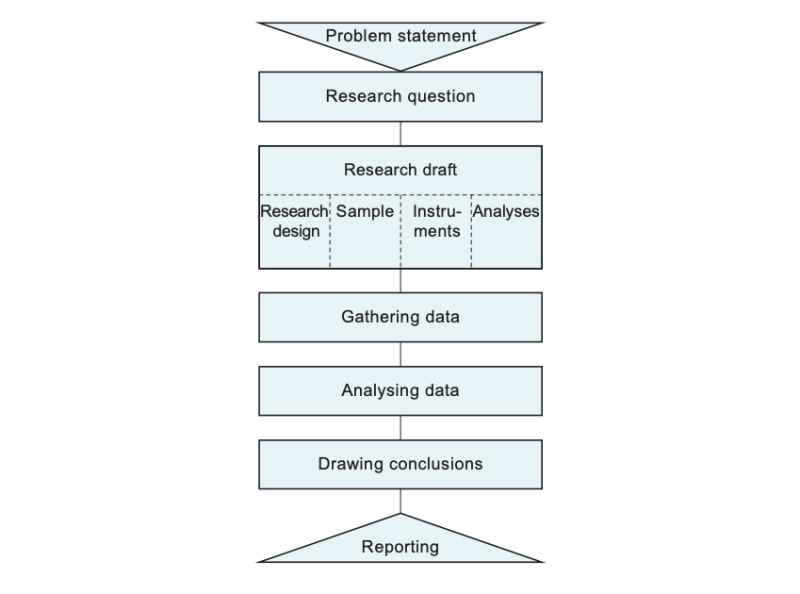
Problem statement
The problem statement can be seen as part of the research: without a problem there will be no research. However, you may wonder whether that is correct. Let us review this issue.
Some decades ago it was common to do (scientific) research to solve problems. When research was done, the scientist first had to investigate the problem thoroughly, then read theories about the issue including the research done already, and finally the scientist had to state a research question that might contribute to solve the problem. This was thought to be in contrast to the work done by practical researchers working in the same area. Scientists often called this kind of research ‘quick and dirty’ because the aim of this research was to solve a problem for a company. It did not have to contribute to a theoretical framework. Ever since research is divided into two counterparts: fundamental research and practical research.
A lot of prejudice was created with the vision described above. In short: fundamental research is very theoretical and statistical, and and has no roots in daily life. And in contrast: practical research is dealing with the problems of daily live, is not scientific and theories are not useful because they do not agree with reality. Maybe I am exaggerating a bit, but basically this was the general vision then, and some people (and scientists) still think this way.
In both views, research can be referred to as problem-solving. The initiation of an investigation means that the researcher is seen as a problem solver. But, if a problem is identified, it does not mean that research must be done. Some problems disappear without research. The solution can already be found somewhere else. An experienced problem is therefore very personal. Sometimes a problem is identified, but the researcher does not get all the information to find the right solution. And if the researcher comes up with a solution, he is often not the one applying the solution. The researcher is therefore not a problem solver. How can the problem definition then form part of the research?
The problem statement can be seen as a description of the field. A researcher who knows what is going on there may possibly set up a better investigation (but that is not a guarantee). Understanding the entire problem and having knowledge of all theories with which the problem could be solved are sometimes not necessary at all. It can even be a hindrance to arrive at a good solution. Sometimes you have enough general knowledge.
This gives a totally new vision on the task of a researcher and his responsibilities. A researcher is not a problem solver, but an advisor. He gives answers to questions that cannot be answered immediately. First new information has to be gathered and analysed before an answer or an advice can be given. Therefore the research question is far more important than the problem.
Furthermore, a researcher is one of the advisors. A lot of researchers might work on big problems, and they all might give different answers. Now it is up to the chairman of the company, the mayor of the town, the government or anybody who is responsible for the policy to make the right decisions.
I wrote this vision down in a schedule I created in 1994. That book isn’t available anymore. Sorry. However the schedule is still there and most parts are explained in this dictionary.

In general all actions that should be taken to do (scientific) research are in accordance with this model:
1) Make clear what the problem is.
2) Formulate a research question.
3) Describe the way to give an answer on this question by:
a) describe the research design;
b) describe the population, the way of sampling and the objected response;
c) describe the instruments that will be used for gathering the information;
d) describe the way the data are going to be analyzed.
4) Gather the data.
5) Analyse the data.
6) Draw conclusion.
7) Write it all down in a paper (or alternatives) and publish this information for general use.
To conclude, defining and thoroughly investigating the problem is not necessary to do research. Researchers do not solve the problem with their research; they provide information how to fix a problem. However, some knowledge about the situation and useful theories can be an advantage to do better research.


